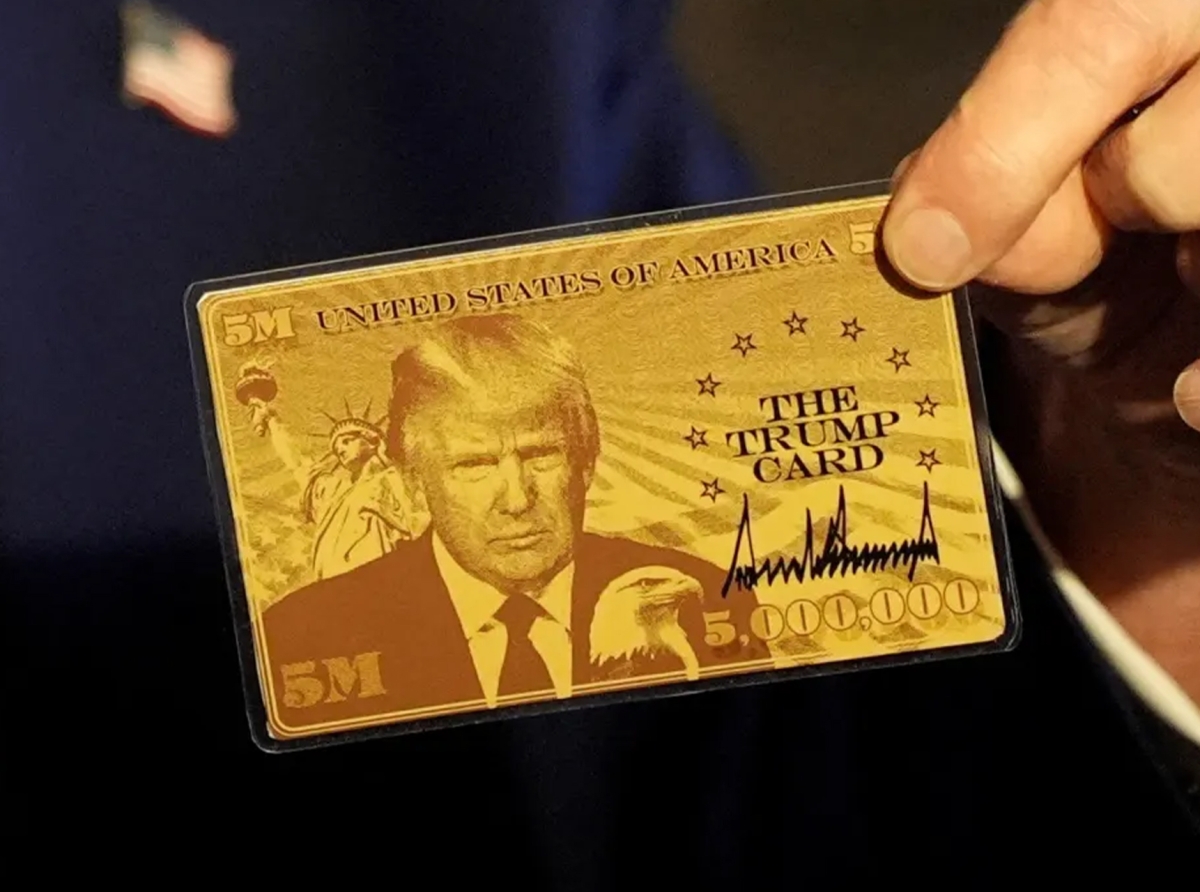Trump’s $5 Million 'Golden Ticket': A Gateway to U.S. Citizenship?

Trump’s $5 Million 'Golden Ticket': A Gateway to U.S. Citizenship?
In an era where globalization meets heightened nationalism, President Donald Trump has introduced a provocative idea: the "$5 Million Trump Card," a program aimed at attracting wealthy elites to the United States through a lucrative pathway to citizenship. The initiative is part of a broader trend known as "investment migration," where affluent individuals can gain residency or citizenship in exchange for significant monetary investments.
While similar programs exist globally—from Portugal's Golden Visa to Malta's Citizenship by Investment—the Trump Card seeks to position the U.S. as a premier destination for ultra-high-net-worth individuals. But beneath the glitz of gold-plated ambition lie complex questions about legality, morality, and practicality.
While similar programs exist globally—from Portugal's Golden Visa to Malta's Citizenship by Investment—the Trump Card seeks to position the U.S. as a premier destination for ultra-high-net-worth individuals. But beneath the glitz of gold-plated ambition lie complex questions about legality, morality, and practicality.

Trump’s $5 Million 'Golden Ticket': A Gateway to U.S. Citizenship?
What Is the Trump Card?
At its core, the Trump Card is a revamped version of existing investor visa schemes, such as the EB-5 Immigrant Investor Program.Under the proposed plan, individuals or families who invest $5 million in the U.S. economy would receive expedited access to residency or even citizenship. Unlike traditional immigration routes, which often involve years of waiting and stringent eligibility criteria, the Trump Card promises a faster, albeit pricier, alternative.
According to Commerce Secretary Howard Lutnick, the program aims to attract up to 200,000 applicants annually, generating $1 trillion in revenue for the Treasury.
These funds, he argues, could help reduce the federal deficit while stimulating economic growth. To sweeten the deal, the physical card itself will reportedly be crafted from real gold—a symbolic nod to its exclusivity.
The Growing Market for Golden Visas
The Trump Card arrives at a time when the global market for investment-based visas is booming. Wealthy individuals are increasingly seeking second passports or residencies as hedges against political instability, tax burdens, or personal safety concerns. Research firm Henley & Partners estimates that record numbers of millionaires are relocating in 2023, driven by factors such as rising taxes, geopolitical tensions, and lifestyle preferences.Countries like the UAE, Switzerland, and Singapore have long been magnets for affluent migrants, thanks to favorable tax regimes and robust economies. Meanwhile, European nations such as Spain, Portugal, and Greece have leveraged their golden visa programs to attract foreign capital during economic downturns. However, recent backlash against these schemes—criticized for enabling "cash-for-passport" deals—has led some governments to impose stricter regulations or phase them out entirely.
Against this backdrop, the Trump Card could fill a void left by declining options elsewhere. For instance, China's crackdown on outbound capital flows and escalating trade tensions with the U.S. have limited Chinese elites' ability to pursue Western citizenship. Similarly, Middle Eastern investors seeking stability amid regional conflicts view the U.S. as a safer haven compared to volatile domestic markets.
Challenges Facing the Trump Card
Despite its allure, the Trump Card faces several obstacles that could undermine its success:Legal Hurdles
Implementing the program requires amending existing immigration laws, including the EB-5 framework. Given the contentious nature of immigration reform in Congress, securing bipartisan support for the Trump Card may prove difficult. Additionally, any changes to tax policies—such as exempting cardholders from worldwide income taxation—would need approval from both lawmakers and the IRS.
Market Size Uncertainty
While Lutnick claims a potential pool of 37 million eligible buyers, experts remain skeptical. Altrata data suggests there are approximately 276,000 ultra-high-net-worth individuals outside the U.S., with assets exceeding $30 million. Even within this group, willingness to spend $5 million on a visa varies widely based on individual circumstances and motivations.
Security Concerns
Allowing wealthy foreigners to bypass standard immigration procedures raises red flags about vetting processes. Critics worry that inadequate background checks could expose the U.S. to risks associated with money laundering, organized crime, or espionage. Furthermore, the Biden administration's stance on admitting Chinese nationals under such programs remains unclear, given ongoing trade disputes between the two nations.
Tax Implications
One of the most contentious aspects of the Trump Card is its proposed tax exemption for cardholders. Currently, U.S. citizens and permanent residents must pay federal income taxes on worldwide earnings. Granting wealthy foreigners immunity from this obligation creates a glaring disparity—and potentially exploitable loopholes. For example, dual citizens might renounce their U.S. citizenship to qualify for the Trump Card, thereby avoiding hefty tax liabilities.
Public Perception
Selling citizenship has always carried a stigma, often perceived as commodifying national identity. Opponents argue that the Trump Card undermines the principles of merit-based immigration, favoring wealth over talent or humanitarian considerations. Such criticism could erode public trust and fuel opposition to the program.
Potential Demand and Regional Interest
If implemented, the Trump Card is likely to draw interest primarily from three key regions:China
With nearly 46,000 ultra-high-net-worth individuals, China represents a massive untapped market. However, strict currency controls and strained diplomatic relations may dampen participation rates.
Middle East
Home to around 19,000 ultra-wealthy individuals, the region offers fertile ground for recruitment. Investors from Saudi Arabia, Qatar, and the UAE are already active participants in global real estate and business ventures, making them natural candidates for the Trump Card.
Other Markets
Countries like Mexico, Brazil, Russia, and the UK also harbor significant pools of eligible applicants. Notably, corporate giants like Apple have expressed interest in purchasing bulk cards to facilitate international hiring—a testament to the program's appeal beyond individual investors.
Impact on Existing Programs
The Trump Card poses a direct challenge to the EB-5 program, which currently dominates the investor visa landscape. By lowering barriers to entry and offering enhanced benefits, the new initiative could overshadow its predecessor. Yet dismantling the EB-5 framework—which enjoys strong bipartisan backing—risks alienating stakeholders invested in its continuation.
Moreover, introducing the Trump Card without addressing systemic flaws in the EB-5 system—such as fraud, abuse, and lackluster job creation metrics—may exacerbate existing problems rather than solve them.
A Bold Idea with Uncertain Prospects
The Trump Card embodies the former president's signature blend of audacity and pragmatism. If executed effectively, it could inject billions into the U.S. economy, attract top-tier talent, and solidify America's status as a beacon for global wealth. However, achieving these goals hinges on overcoming formidable legal, fiscal, and reputational hurdles.Ultimately, the success of the Trump Card will depend on striking a delicate balance: appealing to affluent elites while safeguarding national interests, fostering economic growth without compromising integrity, and innovating within a framework that respects democratic values. Whether this ambitious vision translates into reality remains to be seen—but one thing is certain: the world will be watching closely.









Report
My comments